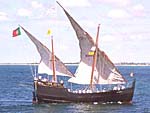
Unit 2: How Trade and Travel Changed the World
Lesson H: Exploration and Contact in the Atlantic
Lesson Overview
Advances in technology and the rise of Europe sparked the transformation of the world by the 16th century. Oceanic exploration and the colonization of the Americas permanently altered the pace of modern history. Expanding avenues of travel allowed the demand for valuable goods to be met by new markets across the globe. Competition for goods and new labor systems fueled the rise of European states and the exploitation of human and natural resources in both the New and Old World. As the pace of change in the early modern world increased, so did the gap between the haves and the have-nots.
Key Questions
- How and why did trade and interaction lead to changes in political, economic, and social systems?
- How did geography and location significantly impact events in history?
- What factors contributed to the establishment, expansion, and decline of empires?
Student Outcomes
- Explain how competition for Asian goods, Ming China's demand for silver, and the restriction on European commercial trade, led the Portuguese, Dutch, and Spanish to explore the Atlantic Ocean.
- Analyze how the Spanish and Portuguese were able to establish colonial empires in the Americas.
- Analyze the extent of cultural exchange between the colonizers and indigenous peoples, such as the Spanish with the Aztecs and Incas.
- Assess the uses and credibility of a source by examining personal and contextual influences and by corroborating with other historical sources. (Historical Thinking Skill)
Key Terms
Student Resources
- Atlantic Exploration Graphic Organizer (doc)
- Atlantic Exploration and Contact Brief Constructed Response (BCR) (doc)
- Historical Investigation - New World Cultural Blending (doc)
- Atlantic Colonization Brief Constructed Response (BCR) (doc)
Chart of Activities:
| Activities to Complete | Estimated Time |
|---|---|
| Pre-Assessment | 5 minutes |
| Key Terms | 5 minutes |
| Activator: The World 1300-1550 | 5 minutes |
| Opening: Modern Migration | 10 minutes |
| Activity 1: Atlantic Exploration | 15 minutes |
| Activity 2: The Birth of Colonial America | 15 minutes |
| Activity 3: Atlantic Exploration and American Discovery | 10 minutes |
| Activity 4: Foreign Customs Meet Native Culture | 10 minutes |
| Activity 5: New World Cultural Blending | 15 minutes |
| Review and Assessment | 30 minutes |
| Lesson Summary | 5 minutes |
Lesson Completion Time
The total estimated time to complete this lesson is 125 minutes.
Page Notes:
[1] Source: This image from http://en.wikipedia.org/wiki/File:Caravel_Boa_Esperanca_Portugal.jpg is in the public domain.



